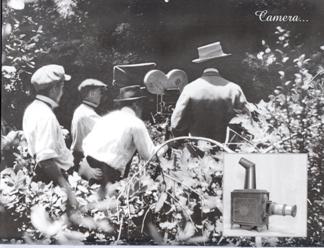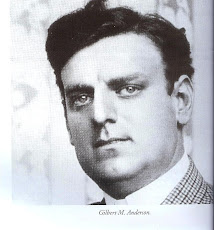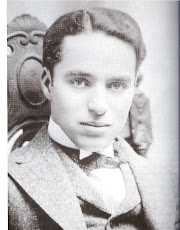Hello movie fans!
This last weekend, I started my research of the movie industry in northern California, and why it settled here. As I was "surfing" the net, I came across a most interesting site that had pictures and stories of the people and events that lead up to the movie making era that occurred in this area. As a result I found these wonderful photos (see above) to introduce my theme.
The top photo(Lights)was taken during a film shoot(c 1913).Please note the early film equipment used with the film canisters. That is so ancient in comparison to the digital filming methods used today. During our film journey into the past, we will be exploring the use of the film equipment used during this early period.
The middle photo (Camera) was taken c 1914 (Sanborn/Frustuck Collection, Fairfax Historical Society)while filming a motion picture in Marin,California. We will also be researching the many local areas that were used for making movies. California offered warm weather and (fairly) consistent sunshine that was essential for providing the natural light necessary for decent filming using these inefficient cameras. Unlike "electronic" computerized cameras of today, they were very basic and simple. They could not adjust well to the lighting available at hand, so ideal "natural" conditions had to exist before any filming could be done. The inset photo shows a "magic lantern" c 1870's which was the earliest form of slide projector. It gave a very crude impression of motion to the viewer,with a lot of imagination on the viewer's part! (Sanborn/Frustuck Collection, Fairfax Historical Society)
The bottom photo(Action!) shows a well known actress of the day, Beatriz Michelena
(in the boat). The actress in the inset photo is unknown. Many of the actors and actresses did their own stunts. As a result many were badly hurt, as Beatriz was many times during her filming career. The photo was taken during the filming of "Salomy Jane" c 1914 on the Russian River. (Fairfax Historical Society)
We will also examine the early film actors and actresses that made the silver screen come alive. Charlie Chaplin, and Gilbert Anderson (aka Broncho Billy) were notables that made major contributions to the early film industry.
They were also businessmen that greatly contributed to the local economy by bringing film making into our back yard. They were instrumental in setting up studios and in so doing were responsible for hiring local citizens of Hayward, Castro Valley,and the surrounding townships.For example,Essenay Studios was established in Niles Township in 1907 and the studio produced four movies per week on average! Because of the film making industry, local carpenters, horsemen, blacksmiths,restaurateurs and other small companies and workers flourished. So,we will examine the effects on the local economy during the height of the film making era here and afterward in the coming weeks.
On Sunday, April 11,2010 I visited the Niles Essanay Silent Film Museum. located in Old Town Niles in Fremont,California. I met several wonderful people that are anxious to assist me in putting this project together.I met and interviewed the President of this organization and two of the docents that are very enthusiastic about preserving this piece of local history. I will script(post)my findings in a later scene(blog).
David Kiehn, author of "Broncho Billy and the Essanay Film Company" was there for a special showing of old movies to a historical group that was there in costume. I will post these photos later. He signed his book for me, and graciously allowed me to interview him as well about the contents of his book. I will certainly be using it as part of my research, as well as continuing to visit with him about related topics. All in all it was a really fun and informative day. For anyone that is interested in early film making this museum is a must see!
Tuesday, April 13, 2010
Subscribe to:
Post Comments (Atom)





.jpg)

.jpg)

It is amazing how often California's mild Bay Area climate is an integral reason for various entities coming here! We certainly see the climate being a part of the reason for the burgeoning film industry, not to mention the success for horticulture and agriculture. Climate was also a reason for placing so much of the testing of aircraft during WWII on the California coast.
ReplyDelete